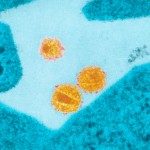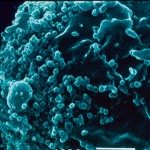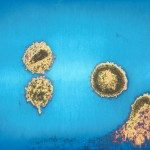Link to Pubmed [PMID] – 17092330
Retrovirology 2006;3:81
BACKGROUND: We have previously reported that CD4 T cells from some exposed uninfected (EU) Vietnamese intravenous drug users are relatively resistant to HIV infection in vitro. Here, we further characterized the restriction of viral replication in CD4 T cells from five EUs and assessed its persistence in serial samples.
RESULTS: CD4 T cells and/or PBMC sampled during a period of between 2 and 6 years were challenged with replication-competent HIV-1 and other retroviral particles pseudotyped with envelope proteins of various tropisms. CCR5 expression and function in resistant CD4 T cells was evaluated. The step at which HIV-1 replication is restricted was investigated by real-time PCR quantification of HIV-1 reverse transcripts. We identified three patterns of durable HIV-1 restriction in EU CD4 T cells. CD4 T cells from four of the five EU subjects were resistant to HIV-1 R5 infection. In two cases this resistance was associated with low CCR5 surface expression, which was itself associated with heterozygous CCR5 mutations. In the other two cases, CD4 T cells were resistant to HIV-1 R5 infection despite normal CCR5 expression and signaling function, and normal beta-chemokine secretion upon CD4 T cell activation. Instead, restriction appeared to be due to enhanced CD4 T cell sensitivity to beta-chemokines in these two subjects. In the fifth EU subject the restriction involved post-entry steps of viral replication and affected not only HIV-1 but also other lentiviruses. The restriction was not overcome by a high viral inoculum, suggesting that it was not mediated by a saturable inhibitory factor.
CONCLUSION: Various constitutive mechanisms of CD4 T cell resistance to HIV-1 infection, affecting entry or post-entry steps of viral replication, are associated with resistance to HIV-1 in subjects who remain uninfected despite long-term high-risk behavior.



